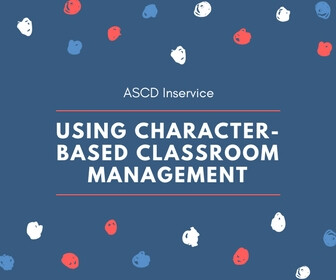Assessment should be a fundamentally collaborative and strengths-focused process, says school administrator Myron Dueck, author of Giving Students a Say: Smarter Assessment Practices to Empower and Engage (ASCD, 2021). Dueck will be co-leading a three-day ASCD virtual retreat (with Jay McTighe and Carol Ann Tomlinson) on Curriculum, Instruction, and Assessment with Impact from July 19-21. We caught up with him to discuss ways to facilitate learner-empowered assessment.
What’s one shift that needs to happen for students to be co-creators of their own assessment practice?
For the longest time, assessment is what we've done to students, not with them. If you look into the Latin origins of the word “assessment,” it comes from the Latin assidere, which means “to sit beside.” As educators, we've generally not sat beside but maybe sat across from our students and said, "Here's where you've met the outcomes and here's where you haven't. I've created the questions, I'm creating the assessment, and I'm going to report on you." And the student, if this scenario was an airplane, is a passenger falling asleep in the cabin instead of acting as a designated copilot. Assessment should be performed with students. It really comes down to having a different purpose. If our purpose is to do this with our students, then it's going to permeate a lot of different things we do.
So, what are some action steps educators can take to involve students in the assessment process?
I'm going to show people at the ASCD retreat something that we've been doing around students co-creating their own learning targets. I make the learning targets really clear in my classroom. Students can actually choose the verb and the content area to create their own learning target. So it could be, "I'm going to explore the use of dogs in avalanche rescue efforts,” because maybe you're covering snow ecosystems and you've been talking about the human interaction in environmental spaces or whatever that might be.
A neat thing we started in our school is something called the "inquiry pizza," which aims to give students a say. It is literally like a pizza menu. You choose a sentence starter like, "How does...", "Where might...", "What can...", and then you go over to a topic box such as media, technology, or AI, and you choose from that box, then jump over to verbs. To make a long story short, you could say, "How might increasing women's literacy rates impact democracy?" In this way, you're jumping in between these menus. This practice has really taken off with the teachers I have worked with in the U.S. and Canada.
Did the pandemic reveal anything about the efficacy of current K-12 assessment practices?
Well, students didn't stop learning when schools entered remote learning. I noticed with my own children that there was still a will to learn. Now, some of them might have been learning how to make money on Fortnite or learning new things to do on Minecraft, and a lot of kids, fortunately or unfortunately, just went down the vortex of video games and being online. We have some work to do as far as reintegrating some students back into society. But as far as assessment goes, a lot of teachers were lost on how to assess remotely—because their students weren’t right in front of them in the controlled atmosphere of their classroom. In fact, in one of my early sessions with teachers during the pandemic, one of them said, “I can’t use my existing multiple-choice tests; I don’t know how I’m supposed to assess my students.”
Teachers who diversified their assessment portfolio during the pandemic and allowed for more opportunity for student exploration, such as those inquiry questions I referred to earlier, found more success. Some teachers allowed students to use their own communities and even their own home to explore their learning. I saw one PE teacher who had students record a workout using only items found at home. So, I think remote learning really pushed some educators to explore new ways to assess.
Could nontraditional grading approaches help teachers reenergize learning and classrooms this fall?
Typically, your students are right in front of you and you have what you think are precise assessments (an 8 out of 10 on a quiz or 34 out of 45 on a test) that spit out a percentage grade. I think people are finally realizing that this is an ineffective assessment method and that we need to move toward performance scales. Percentage grading, and even letter grades, are questionable by now when it comes to a true standards-based approach to learning. You don’t need a hundred categories to describe somebody’s learning. In fact, you’re not describing it at all. If you’re using a hundred categories, you’re grading it and ranking it. And on our return to schools this fall, there is far more of an appetite for people to consider things like performance scales and think about how to assess learning over time. Meaning, yes, this fall, assessment could be something more living and breathing than just a one day, one-event type of thing in the form of a percentage grade.
What changes to success-criteria language can educators make to embrace better assessment practices?
You ask an interesting question about language. One of the things that we've really been looking at in our rubric development is to consider strengths-based language for all learners. I think most teachers in general had good schooling experiences. A lot of people in our society, however, don't have great memories about school. They don't think schools are for them. And I think one of the reasons for that is if you look at the lowest level of many rubrics, it's probably going to have negative language: “fails to,” “did not show,” etc.
On the other hand, if I’m running behind my daughter trying to teach her to ride a bike, I don’t run behind her calling out all the things she’s not doing, for example, “Sloan, you’re not balancing right now,” or “Sloan, you’re not putting your foot down.” If I do that, she’s not going to want to get on that bike again. But if I run behind her and say, “Hey, you’re starting to get it. You’re starting to go,” she’ll be encouraged to keep trying. So, what if we designed our rubrics with similar reinforcement phrases like, “You are beginning to put together the concepts of….,” and “You are starting to show an understanding of the basic concepts….”? That’s so different from negative language.
Editor’s note: This interview has been edited for space.
ASCD Virtual Retreat
Do you want to learn more strategies for collaborative, strengths-focused assessment? Join Myron Dueck for a 3-day PD retreat July 19-21.









